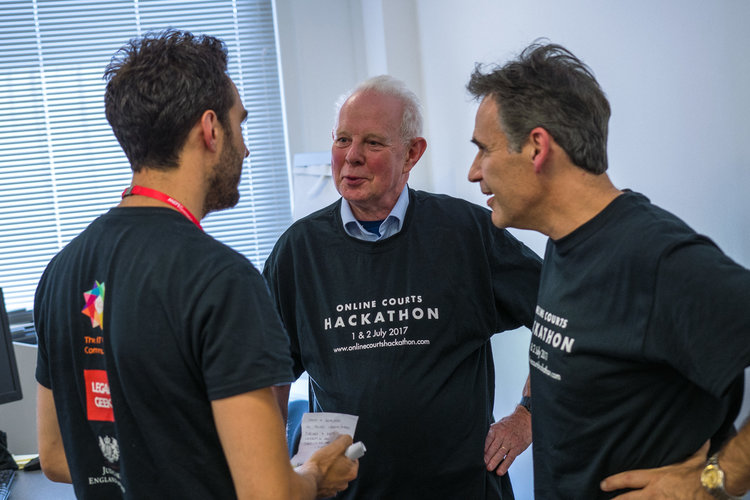Weekly Notes: legal news from ICLR — 10 July 2017
This week’s roundup of legal news and commentary includes digital justice and the online courts hackathon, gripes about the Grenfell inquiry, a new guide for families caught up in the courts, and the G20 summit of world leaders (and a fringe summit of anti-globalisation protesters) in Germany. But first, here’s a photograph to mark the… Continue reading
This week’s roundup of legal news and commentary includes digital justice and the online courts hackathon, gripes about the Grenfell inquiry, a new guide for families caught up in the courts, and the G20 summit of world leaders (and a fringe summit of anti-globalisation protesters) in Germany. But first, here’s a photograph to mark the Law Society’s support for #LegalPride this weekend. (Updated 11 July with extra links.)
Courts
Back to the future
Plans for court modernisation and the Online Court — which were to have been achieved by the Prisons and Courts Bill that got killed off in the sudden death of the last parliament — are back on the agenda following the Queen’s Speech in which her Majesty announced that “Legislation will also be introduced to modernise the courts system and to help reduce motor insurance premiums.”
According to Dods Monitoring, the main purposes of the new Courts Bill (which does not seem to have been published yet) are:
- End direct cross examination of domestic violence victims by their alleged perpetrators in family courts and extend the use of virtual hearings.
- Enable online systems for less serious charges, to plead guilty, accept a conviction and pay a fixed fine. This will go alongside digital services allowing businesses to pursue their cases quicky, to recover debt.
- Modernise the courts, providing a better working environment for judges, allowing more leadership positions in the judiciary on a fixed term, and more flexible deployment of judges to improve career progression.
Proposals which had been in the Prisons and Courts Bill relating to costs and motor insurance litigation, also the subject of some controversy, have been absorbed into a different bill, the new Civil Liability Bill, which again is yet to be published but aims to “crack down on fraudulent whiplash claims” and “is expected to reduce motor insurance premiums by about £35 per year” (according to Conservative Home). The Bill will:
ban offers to settle claims without the support of medical evidence and introduce a new fixed tariff of compensation for whiplash injuries with a duration of up to 2 years.
Online Courts Hackathon
Last weekend over 200 dedicated coders and legal geeks got together at the University of Law in London to see what they could come up with in the way of applied technology in support of the courts. The 23-hour Online Courts Hackathon was jointly organised by the Society for Computers and Law (SCL), Legal Geek, the Judiciary of England and Wales, and HM Courts & Tribunals Service (HMCTS).
The organisers of the event identified eight real life challenges that face online courts: form filling, order drafting, continuous online hearing, argument building, outcome prediction, negotiating & settlement, dispute classification and bundles. Teams including members of London’s top law firms and leading UK universities, as well as tech companies and others, competed to provide solutions.
Awards for the best solutions were given out at the end by the Lord Chief Justice, Lord Thomas of Cwmgiedd, who has been a driving force in the promotion of court modernisation, alongside current president of the SCL, Professor Richard Susskind, and two former SCL presidents, Sir Henry Brooke (who wrote about it on his blog) and his predecessor, 93-year-old Sir Brian Neil.
Legal Geek provided a live feed and video interviews, and Legal Futures reported on the winners: first prize went to a team including members from Wavelength.law and the Law Society, who created an app called CoLin — Your Legal Pathfinder.

Second prize went to a team from Pinsent Masons, which created MobiMapper, a ‘case visualisation and argument mapper’ which “narrows the issues of a case into a single document that a litigant in person might bring to court”.
There were also awards for the Craziest Idea, which went to the Two of Us, Best Teamwork, won by the Gilbert & Tobin team, and for ‘Coolest Tech’, which was awarded to a team from Cambridge University for their ClaimR, an algorithmic decision tree that predicted case outcomes to 83% accuracy.
See also, musing on innovation in legal solutions: Richard Moorhead, on his Lawyer Watch blog, In with the old, but with a new sense of purpose — innovation with users
A note of caution
Not everyone has been cheering on the resumed development of the Online Court, in the form in which it is currently proposed (which is presumably unchanged by the legislative hiatus resulting from the snap election).
Penelope Gibbs, of Transform Justice, has consistently warned against the risks of online hearings and “virtual justice”, on her blog. In one recent post, she points out that “ Most of virtual justice is an evidence free zone”, citing the woeful lack of properly evaluated and up to date research into the taking of evidence via video link. Another, entitled On screen but disconnected? The reality of virtual justice, recounts her experience of visiting a magistrates court that dealt with all the cases remotely, and her concerns about the effect on vulnerable witnesses and defendants.
I know many in the Ministry of Justice think me a Luddite. I’m definitely concerned about the risks to defendants of new technology. And I would plead for everyone involved in court reform to spend a whole day observing a virtual court incognito, and form their own conclusions as to the effect of video on vulnerable defendants.
Another note of caution has come from Professor Roger Smith, in a recent post on the Law, Technology and Access to Justice blog, discussing the earlier Rechtwijzer project in the Netherlands, which does not seem to have lived up to the hopes with which it was developed. He thinks the UK should wait until another current project, in British Columbia, Canada, has been tried and tested and lessons learned. He observes that
a trail of major government IT failures has even merited its own wikipedia entry, revealing rather too many of them (think Universal Credit, for example) as emanating from the UK. For that reason, there seem very good reasons to delay implementation of online courts until we can see what happens in other countries. In particular, gung-ho domestic advocates of online courts should split support in principle from the timing of implementation — where the sensible advice may be to wait and see what lessons arise from the now global leader — BC’s online Civil Resolution Tribunal. This started taking small claims from 1 June. Personally, I would give it at least a year before I spent a single penny.
He also spoke to Legal Futures about this, indicating his concerns:
“It might be a one-time deal because it’s built with the money from selling off the courts — there’s no money to adjust it once it is up and running… let the British Columbians spend the money.”
But he has also made very positive comments on the recent hackathon:
“The hackathon was won by a group which produced a way of taking up a housing disrepair case, which was really imaginative… It’s the kind of case which might well be swept under the carpet because there isn’t any legal aid for it at the moment… and will be highly material to the Grenfell Tower discussions.”
Which leads us on to…
Inquiry
Grenfell gripes
Criticism of Sir Martin Moore-Bick’s selection as the chair of the Grenfell Tower Inquiry has continued, albeit without any actual substance, other than a vague sense on behalf of those purporting to speak on behalf of the victims that he “isn’t one of us”, lacks “empathy”, or in one case applied the existing housing law as he saw it in a way that appeared to support what others have called “social cleansing” (see Emma Dent Coad MP for North Kensington on the Daily Politics on Sunday, admitting she’s never met Sir Martin, nor presumably read the relevant case report).
Having apparently started off on the wrong foot by appearing, in some reports, to play down the ambit of the inquiry (see Weekly Notes — 3 July 2017) or perhaps suggest more forcefully than he need have done that it might not, after all, be all things to all men, he made amends last week by launching a consultation on the terms of reference (although these are ultimately set by the Minister, not the inquiry chair, under section 5 of the Inquiries Act 2005). He said:
“I am determined to establish the causes of the tragedy, and ensure that the appropriate lessons are learnt. To do this, the Inquiry will need to examine all relevant circumstances leading up to and surrounding the fire at Grenfell Tower, in order to understand its causes and prevent such a tragedy ever happening again.
“To produce a report as quickly as possible, with clear recommendations for action, I will listen to people and consider a broad range of evidence, including on the role of the relevant public authorities and contractors, in order to help me answer the important questions.”
“I therefore want to hear from people directly affected by the fire and others involved, to listen to their views on the shape of the Inquiry’s work and the questions we should be seeking to answer.”
He then met with residents and heard some of them voice their objections. He told them
I can’t do more than assure you that I know what it is to be impartial, I’ve been a judge for 20 years, and I give you my word that I will look into this matter to the very best of my ability, and find the facts as I see them from the evidence. That’s my job, that’s my training, and that’s what I intend to do.
Several legal commentators, who know rather more about these things than some of the political and media critics, have defended the appropriateness of selecting a senior retired judge such as Sir Martin Moore-Bick, based on his skills as an impartial, detached and experienced finder of facts in complicated cases, and questioned the motives of his critics, including:
- Simon McKay, on The Justice Gap, Grenfell: In defence of judges
- Gordon Exall, on Civil Litigation Brief, Judges, Fact Finding and Grenfell: the crucial question — is this judge a good fact finder
- Chris Dale, on Oxford Inciter, Malice, stupidity or something else? The mixed motives behind political posturing
- The Secret Barrister, in the New Statesman, Grenfell inquiry: critics of Martin Moore-Bick are dabbling in fearmongering
See also this thread on twitter, where the same commentator makes short work of Emma Dent Coad MP’s objections (quoted from a broadcast interview):
This right here is the problem with our political culture in a nutshell. Ignorance, prejudice and a proud disregard for facts and evidence. https://t.co/FytIg6XUb2
— The Secret Barrister (@BarristerSecret) July 9, 2017
Legal assistance
Two clerks or paralegals employed or being trained by solicitors Leigh Day, have been suspended after it was discovered that they had, of their own initiative, and without involving the firm, put up posters near the Grenfell incident zone offering to “kick-start” insurance claims, contact embassies and draft letters for people affected by the blaze. According to The Times, the poster offered “free legal support”.
The Solicitors Regulation Authority and the Office of the Immigration Services Commissioner were said to be examining the poster amid concerns over “ambulance-chasing” or touting for business among survivors. However, it is not so long ago that we were hearing calls for pro bono assistance in the immediate aftermath of the disaster, much as there had been after recent terrorist incidents in Manchester and London, with lawyers coming forward in droves, and others contributing to fundraising appeals. So despite Leigh Day’s damaged reputation in the wake of allegations concerning Iraq war compensation claims, these two clerks may simply have been acting in a naive spirit of charitable enthusiasm.
Meanwhile, the need for legal advice via proper channels remains acute. Last week the Home Office published its policy for dealing with immigration issues affecting victims and survivors to whom the government had promised a 12-month “amnesty” on immigration checks. Immigration lawyer Colin Yeo on Free Movement explained that this meant,
In short, the Government is offering a grant (or extension) of 12 months leave to enter or remain with access public funds included as well as the right to work.
However, good as that might sound, it might not be so simple, or advantageous.
I would strongly advise anyone considering making such an application to take legal advice before doing so. Accepting a 12 month grant of leave may actually cause problems for some individuals by disqualifying them for settlement. At the end of the 12 month period there is no route to remain beyond that unless the individual qualifies under one of the existing immigration rules, which is unlikely for many. Failing that, the person will have to leave the UK or will face removal.
Clad tidings of not much joy
The somewhat panicky testing of the flammability of cladding on publicly owned blocks of flats has continued in the wake of the Grenfell Tower fire, with the vast majority of such buildings failing the test. Here, for example, is the report of such testing in the London Borough of Islington, which happens to be where both the leader of the opposition (whose party have made some rather regrettable political capital out of the tragedy) and the author of this blog.
However, there are concerns that the testing of cladding is not as comprehensive as it should be: the Independent reports that
Testing is currently being limited to panels made of aluminium composite material (ACM) — the type that is believed to have aided the unprecedented spread of the blaze at the 24-storey building last month.
At least 200 samples from high-rise blocks in 54 local authorities have failed testing, according to a Department for Communities and Local Government (DCLG) spokesperson, all of which were ACM.
But fire safety experts warned The Independent the tests could be the tip of the iceberg, with many other types of cladding likely to fail the Government’s own standard for fire safety.
Meanwhile Rydon, the company that actually did the refurbishment of Grenfell Tower using the cladding in question, has “as a mark of respect” removed all information on the project from its website.
This may or may not follow legal advice, good or bad, or mysterious (like the legal advice which caused the former leader of Kensington and Chelsea Royal Borough Council to cancel a public meeting because journalists had obtained an injunction to enable them to attend and report it). At any rate, Rydon must be considered one of the parties not only to the inquiry itself, but to one or more sets of court proceedings (no doubt also involving various other parties, such as subcontractors) in the ensuing months and years.
Family law
Anonymisation guidance
The Transparency Project has just released a guide on the publication of Family Court judgments, which:
will help parties caught up in the family justice system navigate the complicated issue of publishing judgments about private family matters.
The guide is directed at families and the professionals working with them, to help them think through the possible pros and cons, and the potential practical consequences of publication. Rather than focusing just on issues of anonymisation and jigsaw identification, it aims to involve families in the decision making process about publication, and with the process of anonymising judgments so that privacy protection is robust and effective.
This is just the latest of a series of guidance notes which the charity has published, partly with assistance of the Legal Education Foundation. (ICLR’s Paul Magrath is a member of and contributor to the Transparency Project, which promotes open justice and a better understanding of the family courts and corrects mis-reporting in the media.)
Publication of Family Court Judgments — A guidance note for families & professionals
Dates and deadlines
CARALL conference
The annual Conference and Annual General Meeting of the Caribbean Association of Law Libraries will take place in Nassau, Bahamas at the Melia Nassau Beach All Inclusive Hotel, from 24 — 27 July 2017.
Law librarians from various Caribbean territories meet to champion the cause of law librarianship and enhance their knowledge base by sharing goals, ideas and resources. ICLR will not be attending person but our agents, Wildy’s, who represent us in these territories, will certainly be there, and can talk to librarians and other delegates about the exciting new development of our ICLR.3 platform.
Law (and injustice) from around the world
Canada
Chief Justice replacement
The present chief justice of Canada’s Supreme Court (which we visited in May) announced last month that she would be retiring in December this year. Beverley McLachlin was the first female chief justice of the Supreme Court of Canada, and the first in any equivalent court in the Commonwealth. She grew up in Alberta, and practiced law for some years at firms in Edmonton, Fort St John and Vancouver before becoming a professor of law at the University of British Columbia in 1974. She became a judge in 1980 and after rapid promotion became chief justice of British Columbia in 1988, before joining the Supreme Court of Canada the following year. She was appointed Chief Justice of the Supreme Court in 2000.
No doubt she will be a hard act to follow. The question is, who is to fill her place when she goes? The Montreal bar is calling on tradition to be respected and for the next chief justice of the Supreme Court of Canada to be a Quebecer. According to the National Post:
Bar president Brian Mitchell says the law society sent a letter to Prime Minister Justin Trudeau late last month in which it outlined its position. […]
The letter from the bar states that according to tradition, the position of chief justice is assigned alternately between judges who come from a civil law background in Quebec and common law background elsewhere in the country. The bar wrote that it’s also important to alternate between French and English chief justices.
You can read the letter (in French).
This is an issue that doesn’t arise in the UK, though it’s worth pointing out that the UK Supreme Court covers multiple jurisdictions, and has judges from Scotland and Northern Ireland as well as from England and Wales. However, we are not aware of any suggestion that, for example, there should be a Scottish or Northern Irish president or deputy president, on the basis of some sort of McBuggins’ Turn rotation principle. (Perhaps a deal like Theresa May’s with the DUP could have specified something along those lines…)
Germany
G20 Summit
Representatives of the world’s twenty richest / most powerful national gathered in [location] to discuss [stuff they could have done on skype] while outside thousands of protesters fought police, set fire to cars, looted capitalist shops to liberate the goods enslaved there, stole hegemonic hamburgers, and took selfies on their [surely not that exploitatively manufactured] smartphones.
Yes, more of that same-old same-old. Only this time, it was different. Why? Because Trump. And more particularly, because La Trumpette, former model and businesswoman Ivanka Trump, who seems to have been sitting in for her busy dad on a few of those big meetings with world leaders. This raised serious eyebrows, but then so did the amount of time Trump spent with Vladimir Putin, the Russian leader, with whom he seems to have got on like a house on firewall down alert.
Actually, Trump’s absence from key meetings is a symbol of a wider absence, or absenting, of America from the world stage, on which American leaders used to be pre-eminent. Leader of the free world? This year’s host, Angela Merkel, chancellor of Germany, now seems a likelier candidate. She is smaller than most of the other delegates, in physical height, but she stands out when you see her centred in the official group pictures, dressed in red, against a sea of anonymous blue suits. Even Theresa May, who comes across as increasingly awkward at these international jamborees, was dressed in the uniform blue.
Afterwards, May gave a statement on the main issues discussed at the summit, including Counter-terrorism, Modern slavery, Climate change, Trade and the global economy. In relation to the last, the UK Prime Minister said:
I have held a number of meetings with other world leaders at this summit and have been struck by their strong desire to forge ambitious new bilateral trading relationships with the UK after Brexit.
(No doubt some of them *might* have added, “… although we would much rather not have had to bother with this ridiculously costly, time-consuming, bureaucratic and diplomatic procedure, if only the UK had sensibly stayed in the EU”.)
As for climate change, this was one occasion where Theresa May seemed commendably less willing to hold Donald, President Trump’s hand.
Like other world leaders here, I am dismayed at the US decision to pull out of the Paris Agreement and I have urged President Trump to re-join it.
Nevertheless, it is now being reported that Trump may be visiting the UK, and soon. If so, he can expect a warm reception from inhabitants of this side of the Special Relationship.
Hopefully not as chaotic and violent as that offered the world leaders in Hamburg last week, as reported in Al Jazeera.
Vietnam
Blogger jailed
English PEN reports that Nguyen Ngoc Nhu Quynh, also known by her pen name Me Nam (‘Mother Mushroom’), was convicted on 29 June 2017 of ‘conducting propaganda against the Socialist Republic of Vietnam’ under Article 88 of the Penal Code and sentenced to 10 years in prison.
PEN believes that Me Nam is being targeted for peacefully exercising her right to freedom of expression. We are therefore calling on the Vietnamese authorities to quash Me Nam’s conviction and release her immediately and unconditionally, in accordance with Article 19 of the International Covenant on Civil and Political Rights (ICCPR) to which Vietnam is a state party.
For further background information, please visit the PEN International website.
Tweets of the Week
… (two of them, because cute dog) come from Andrew Langdon QC, recording the #LegalPride march over the weekend.
#legalpride pic.twitter.com/Krw6H8WAWB
— Andrew Langdon QC (@westcrct) July 8, 2017
#legalpride yes your Ladyship pic.twitter.com/sEf1vAh4l5
— Andrew Langdon QC (@westcrct) July 8, 2017
That’s it for now. Our thanks to all who flagged up stories, via their blogs (which we always try to acknowledge) and via Twitter (where useful tweets are retweeted).
This post was written by Paul Magrath, Head of Product Development and Online Content at ICLR, who also tweets as @maggotlaw. It does not necessarily represent the opinions of ICLR as an organisation. Comments welcome on Twitter @TheICLR. Sign up now for weekly email alerts from this blog. Just put your email address into the box on the left.



